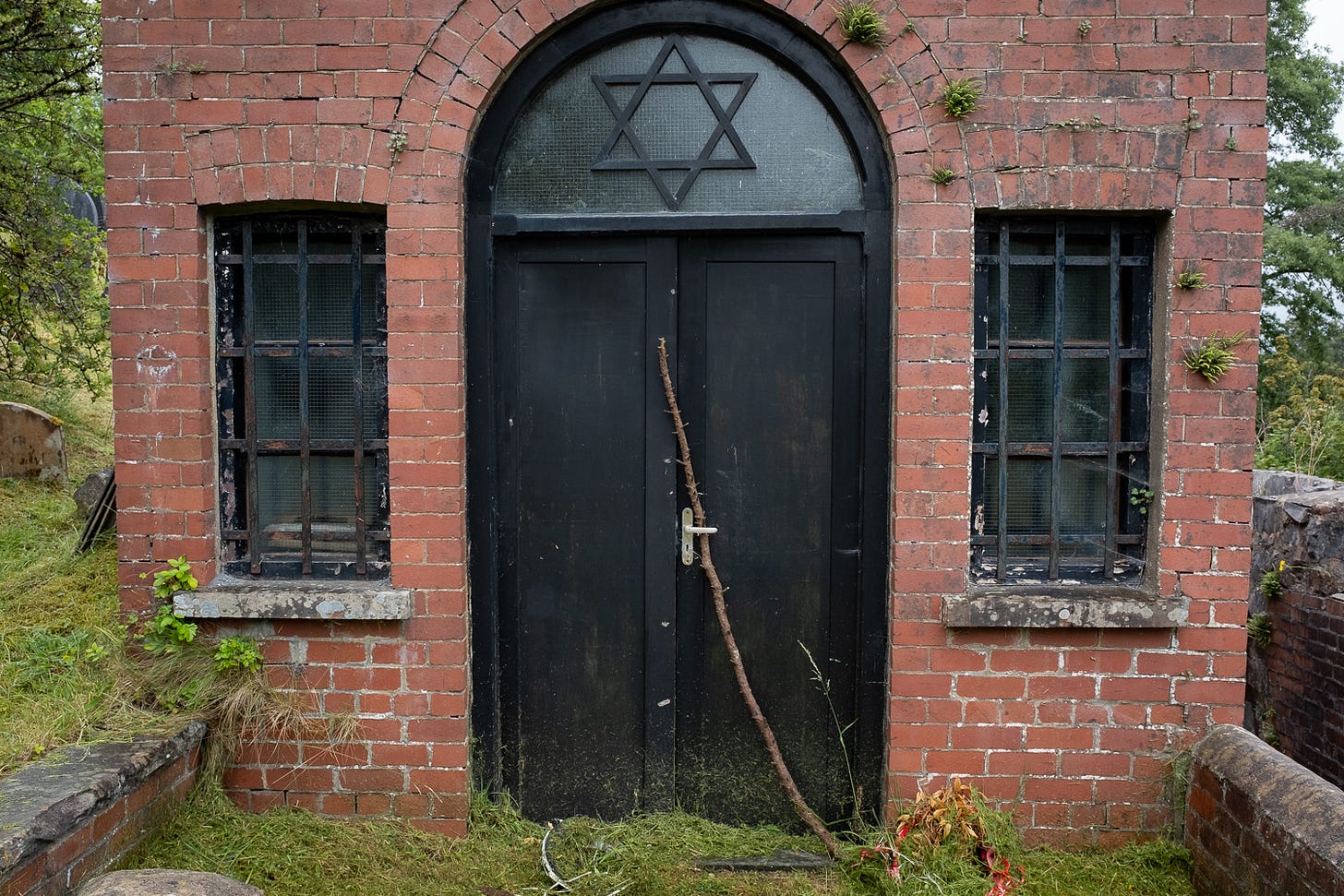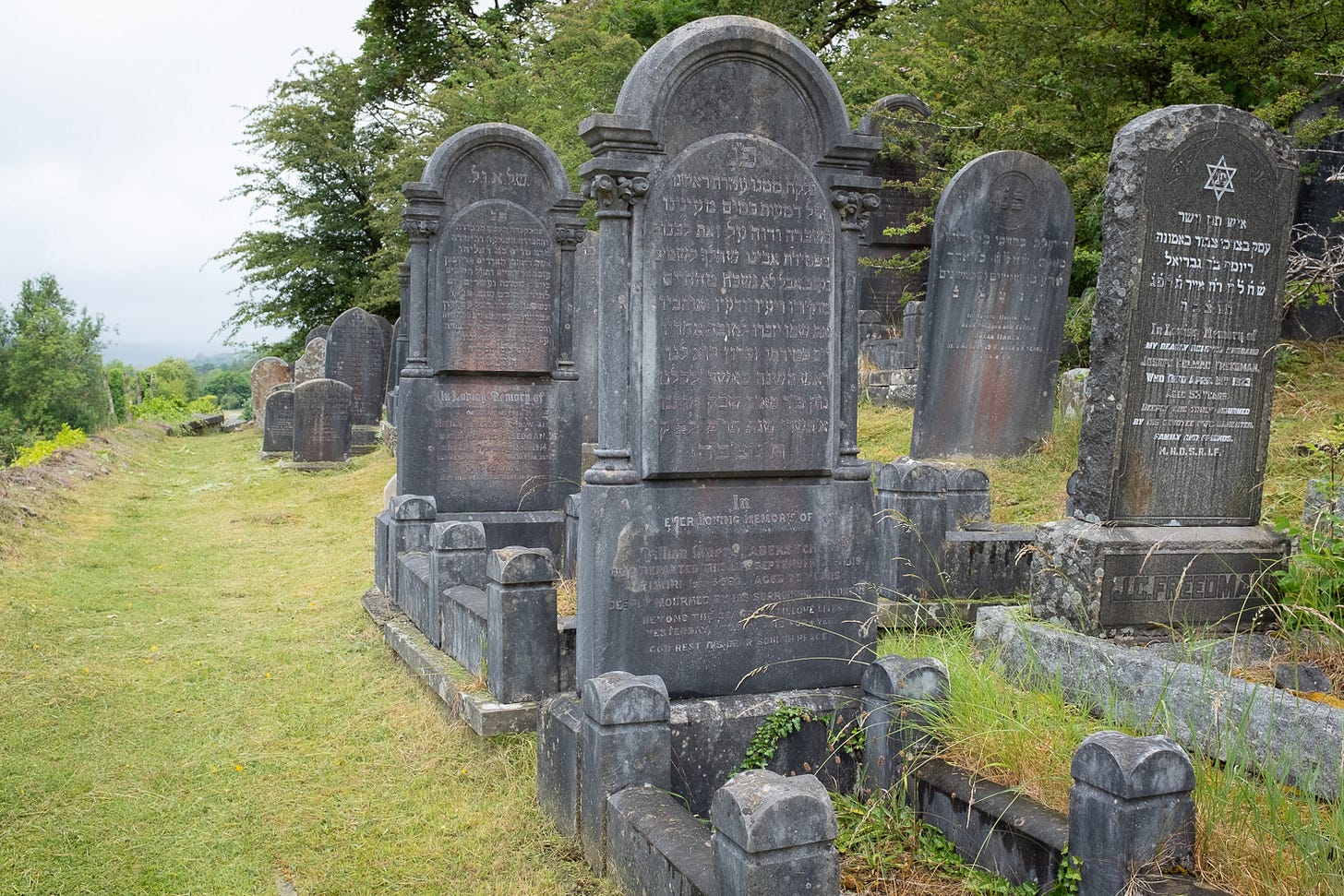The edges of Merthyr Tydfil spread up the hill and along the valley. Below the road fell a cemetery, above it the bank was overgrown with summer, wet with the constant rain. A funeral director’s built out of pebble dash and corrugated iron fell into disrepair, its sign streaked with rust. I climbed the stairs behind it to the Jewish cemetery. Weary gravestones, topped with stars looked down at their toes, covered in fresh cut grass which made the air sweet.
I was able to catch a ride from the main road. It ran up the hill angrily and most cars barely noticed me. I was wrapped in my new camouflage army coat, given to me by the last driver. I was grateful for it in the rain.
Rick pulled precariously onto the verge. He leaned over and helped clear some space on the back seat for my bags. “Don’t worry about them,” he said as I grabbed a handful of documents, “Chuck ‘em on the floor.” I did.
Rick had a wispy grey beard that looked like wool caught on a barbed wire fence. He had round blue eyes and breath that smelt of cheese and onion. He spoke passionately and excitedly and told long winding stories in which every line seemed to be a great surprise.
“Thanks for picking me up,” I said, “It wasn’t a good place to hitchhike from.”
“I’ve been there mate,” he said knowingly, “There’s absolutely no public transport in central Wales so I always used to hitchhike.” He told me a long story about the first time he hitchhiked into town and how his mother had been furious. He hitchhiked all through Europe when he was a teenager and then drove a motorbike through North Africa too. My presence in the car budded memories and he picked them one by one.
“I discovered Muslims were really nice people too,” he said enthusiastically, “You see, I used to be in the army and my opinions of Muslims were… it’s fair to say… pretty awful. But I realised they were just like the rest of us. They were just as nice!”
The raindrops burrowed along the side windows, their long tails in pursuit.
“You see we’ve got this twenty-minute rule in mid Wales,” Rick explained as if reading my mind, “If it’s not raining now, it probably will be in twenty minutes!” Not all rain is the same though, he clarified. There are many types of rain: “You’ve got this kind of rain,” he motioned to the fine mist outside, “It’s very light but it gets you just as soaked. Then you’ve got drizzle, then you’ve got normal rain, then you’ve got really fucking raining rain, then you’ve got sideways rain. That’s the one you fear most. Most days you get all of them round here.”
Back in the day, he would turn a buck from the weather. He’d go to the bottom of Snowdon in his Landrover and sell photographs of the mountain. “You see, most of the time people would climb it and not be able to see a thing because of the cloud.”
“I didn’t see a thing when I climbed it.”
“Exactly. So what I’d do is sell them the picture they wanted to take but couldn’t!”
Framed pictures were £75 - he didn’t sell too many of those - mounted were £25 and it was £15 for just the picture. It was quite good trade apparently.
Rick had had all sorts of jobs over the years. He was in the army for a long time and spent a lot of his youth bouncing doors before that. He got in through the rugby club. A friend of his told him he could earn 90 quid for two nights’ work. “Ninety quid! That was really good money then. My mates were earning that in five days.”
Now he fitted and tested fire alarm systems and was a writer in his spare time. He was writing two novels at the moment and found writing a cathartic escape. He could come home after a stressful day and suddenly he could be in a world of his creation. He explained the plots with typical enthusiasm and a wave of cheese and onion.
The first idea came to him when he was on holiday in Crete. “We used to go to this bar,” he began, “And the guy behind the bar, he really reminded me of Napoleon, I don’t know why. But he was really butch and would sit there and order all the waitresses around. But the funny thing was, he’d never say anything! He’d just nod and point at tables and the bar staff would whizz over there and fill up the water or whatever it was. He was genuinely telepathic.
“So I got this idea… now this guy was the nicest man you’ll ever meet. Absolutely lovely bloke, wouldn’t hurt a fly. But I got this idea that he was actually a drug dealer. And I thought about how people could be coming to the island on pleasure boats from Turkey and maybe they’d be bringing hashish… And it kinda goes on from that really.”
His other novel was also inspired by a moment: “I was waiting in line at a petrol station once,” he began this story even more enthusiastically than the last, “And I saw these two fat guys trying to load an ATM into the back of a van. One of them was just standing there with this big handful of £20 notes and I thought to myself… I thought… maybe I should just nick them!
“But then I ran this scenario through in my head and I realised I couldn’t just nick them of course, I would have been caught like that!” He snapped his fingers, “They would have got my number plate on CCTV…I was wearing a company T-shirt… and all the rest of it. But I pretended I robbed it in my book! And it set off this whole idea of robbing ATMs before they’ve been loaded.”
He’d written 52 chapters and 40,000 words on it.
We’d been going about forty minutes or so when we got to Brecon. I had lunch in town and made my way to the edge. I passed the Dering Lines barracks. Its insignia was on a large sign out front: a fiercely detailed bayonet over a bright red map of Wales. It looked like it was in a pool of blood. On the other side, you could occasionally glimpse the dark hulks of the beacons.
I stood by a roundabout for half an hour. I wasn’t sure I’d get a lift. Cars were accelerating up the hill and people didn’t seem all that friendly. A big black pickup roared past and a kid wound down the window and hurled a plate of crackers at me. I wondered why as I looked at them all broken on the roadside, feeling a little putout.
Ten minutes later a black pickup pulled up and the driver said she could take me a few miles on. She was airy and friendly and had two kids on the back seat.
“I’m so sorry,” she said as we set off up the hill, “I can’t believe my kids threw those crackers at you!”
It turned out they hadn’t thrown them at me exactly, rather they’d just thrown them out and I happened to be in the way. I admitted that it was a weird place for someone to be standing. It was lucky really. Without the crackers, Lucy wouldn’t have turned around to pick me up.
Either way, apparently her daughter had told her not to stop. She thought I’d murder them all, so Lucy decided she’d teach them a lesson. “Look you see,” she said turning to the kids and speaking in a slightly higher voice, a voice reserved for children, “He’s not going to murder you!”
There was a peachy-pink crystal on the dashboard and the black one next to it sparkled in the window. Lucy was glad to see a hitchhiker, she’d done a bit of hitchhiking in her day. She asked if I’d ever read The Moneyless Man. I hadn’t, so she explained it was about a man living without money for a year. She liked the idea of doing that and would avoid money where she could. The other day she traded a sound bath for a reflexology session.
They couldn’t take me far. They were turning off because the girls had rugby practice so they dropped me at the junction. It was in the middle of nowhere. Once they were gone, there was a sudden blue tear in the clouds and a burst of golden light ignited the hillside. The tarmac gleamed and the hedgerows glistened and the far-off clouds became a richer shade of graphite. I felt a rush of energy as the sun hit my face.
Sure enough, twenty minutes later it was raining again.






